
The Hammond organ is an electric organ invented by Laurens Hammond and John M. Hanert and first manufactured in 1935. Multiple models have been produced, most of which use sliding drawbars to vary sounds. Until 1975, Hammond organs generated sound by creating an electric current from rotating a metal tonewheel near an electromagnetic pickup, and then strengthening the signal with an amplifier to drive a speaker cabinet. The organ is commonly used with the Leslie speaker.

Keith Noel Emerson was an English keyboardist, songwriter, composer and record producer. He played keyboards in a number of bands before finding his first commercial success with the Nice in the late 1960s. He became internationally famous for his work with the Nice, which included writing rock arrangements of classical music. After leaving the Nice in 1970, he was a founding member of Emerson, Lake & Palmer (ELP), one of the early progressive rock supergroups.

In music, the organ is a keyboard instrument of one or more pipe divisions or other means for producing tones. The organs have usually two or three, up to five, manuals for playing with the hands and a pedalboard for playing with the feet. With the use of registers, several groups of pipes can be connected to one manual.

James Oscar Smith was an American jazz musician who helped popularize the Hammond B-3 organ, creating a link between jazz and 1960s soul music.

A rhythm section is a group of musicians within a music ensemble or band that provides the underlying rhythm, harmony and pulse of the accompaniment, providing a rhythmic and harmonic reference and "beat" for the rest of the band. The rhythm section is often contrasted with the roles of other musicians in the band, such as the lead guitarist or lead vocals whose primary job is to carry the melody.
Farfisa is a manufacturer of electronics based in Osimo, Italy, founded in 1946. The company manufactured a series of compact electronic organs in the 1960s and 1970s, including the Compact, FAST, Professional and VIP ranges, and later, a series of other keyboard instruments. They were used by a number of popular musicians, including Sam the Sham, Country Joe and the Fish, Pink Floyd, Sly Stone, Blondie, Suicide and the B-52s.
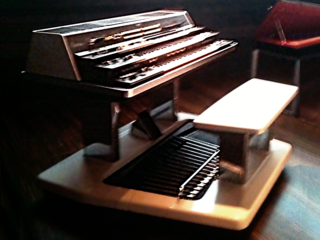
An electric organ, also known as electronic organ, is an electronic keyboard instrument which was derived from the harmonium, pipe organ and theatre organ. Originally designed to imitate their sound, or orchestral sounds, it has since developed into several types of instruments:

A pedalboard is a keyboard played with the feet that is usually used to produce the low-pitched bass line of a piece of music. A pedalboard has long, narrow lever-style keys laid out in the same semitone scalar pattern as a manual keyboard, with longer keys for C, D, E, F, G, A, and B, and shorter, raised keys for C♯, D♯, F♯, G♯ and A♯. Training in pedal technique is part of standard organ pedagogy in church music and art music.
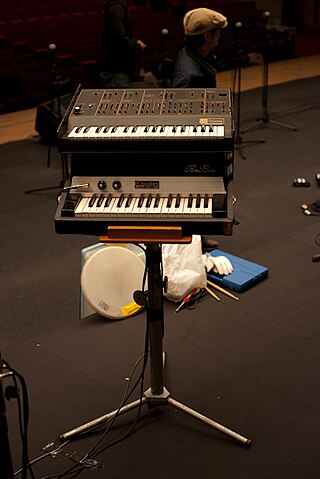
Keyboard bass is the use of a smaller, low-pitched keyboard with fewer notes than a regular keyboard or pedal keyboard to substitute for the deep notes of a bass guitar or double bass in music.

The word "manual" is used instead of the word "keyboard" when referring to any hand-operated keyboard on a keyboard instrument that has a pedalboard, such as an organ; or when referring to one of the keyboards on an instrument that has more than one hand-operated keyboard, such as a two- or three-manual harpsichord.

Bass pedals are an electronic musical instrument with a foot-operated pedal keyboard with a range of one or more octaves. The earliest bass pedals from the 1970s consisted of a pedalboard and analog synthesizer tone generation circuitry packaged together as a unit. The bass pedals are plugged into a bass amplifier or PA system so that their sound can be heard. Since the 1990s, bass pedals are usually MIDI controllers, which have to be connected to a MIDI-compatible computer, electronic synthesizer keyboard, or synth module to produce musical tones. Some 2010s-era bass pedals have both an onboard synth module and a MIDI output.
Keyboard expression is the ability of a keyboard musical instrument to change tone or other qualities of the sound in response to velocity, pressure or other variations in how the performer depresses the keys of the musical keyboard. Expression types include:

An organ trio is a form of jazz ensemble consisting of three musicians; a Hammond organ player, a drummer, and either a jazz guitarist or a saxophone player. In some cases the saxophonist will join a trio which consists of an organist, guitarist, and drummer, making it a quartet. Organ trios were a popular type of jazz ensemble for club and bar settings in the 1950s and 1960s, performing a blues-based style of jazz that incorporated elements of R&B. The organ trio format was characterized by long improvised solos and an exploration of different musical "moods".
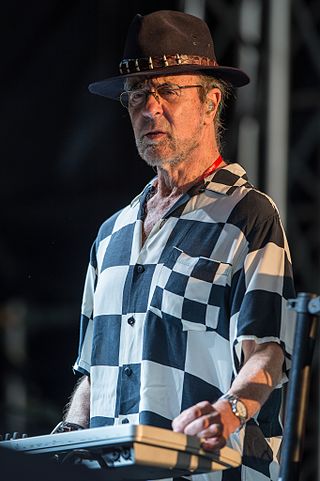
Manfred Sepse Lubowitz, known professionally as Manfred Mann, is a South African-born musician, residing in the UK since 1961. He is best known as a founding member of the bands Manfred Mann, Manfred Mann Chapter Three and Manfred Mann's Earth Band.
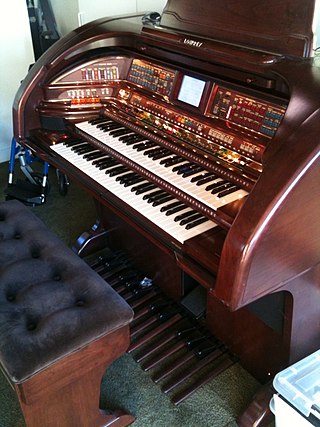
The Lowrey organ is an electronic organ, named after its developer, Frederick C. Lowrey (1871–1955), a Chicago-based industrialist and entrepreneur. Lowrey's first commercially successful full-sized electronic organ, the Model S Spinet or Berkshire, came to market in 1955, the year of his death. Lowrey had earlier developed an attachment for a piano, adding electronic organ stops on 60 notes while keeping the piano functionality, called the Organo, first marketed in 1949 as a very successful competitor to the Hammond Solovox.

This is a glossary of jazz and popular music terms that are likely to be encountered in printed popular music songbooks, fake books and vocal scores, big band scores, jazz, and rock concert reviews, and album liner notes. This glossary includes terms for musical instruments, playing or singing techniques, amplifiers, effects units, sound reinforcement equipment, and recording gear and techniques which are widely used in jazz and popular music. Most of the terms are in English, but in some cases, terms from other languages are encountered.

Ben Kealey is the former English touring keyboardist for the rock band Kasabian. He was born in Leicester, England.
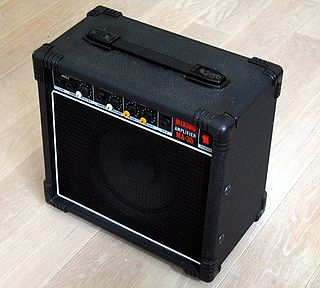
A keyboard amplifier is a powered electronic amplifier and loudspeaker in a speaker cabinet used for the amplification of electronic keyboard instruments. Keyboard amplifiers are distinct from other types of amplification systems such as guitar amplifiers due to the particular challenges associated with making keyboards sound louder on stage; namely, to provide solid low-frequency sound reproduction for the deep basslines that keyboards can play and crisp high-frequency sound for the high-register notes. Another difference between keyboard amplifiers and guitar/bass amplifiers is that keyboard amps are usually designed with a relatively flat frequency response and low distortion. In contrast, many guitar and bass amp designers purposely make their amplifiers modify the frequency response, typically to "roll-off" very high frequencies, and most rock and blues guitar amps, and since the 1980s and 1990s, even many bass amps are designed to add distortion or overdrive to the instrument tone.

Vintage musical equipment is older music gear, including instruments, amplifiers and speakers, sound recording equipment and effects pedals, sought after, maintained and used by record producers, audio engineers and musicians who are interested in historical music genres. While any piece of equipment of sufficient age can be considered vintage, the term is typically applied to instruments and gear from the 1970s and earlier. Guitars, amps, pedals, electric keyboards, sound recording equipment from the 1950s to 1970s are particularly sought after, while musical equipment from the 1940s and earlier is generally far more expensive and sought out mainly by museums or collectors to preserve historical equipment, rather than to perform with.

A rock band or pop band is a small musical ensemble that performs rock music, pop music, or a related genre. A four-piece band is the most common configuration in rock and pop music. In the early years, the configuration was typically two guitarists, a bassist, and a drummer. Another common formation is a vocalist who does not play an instrument, electric guitarist, bass guitarist, and a drummer. Sometimes, in addition to electric guitars, electric bass, and drums, also a keyboardist plays.


















